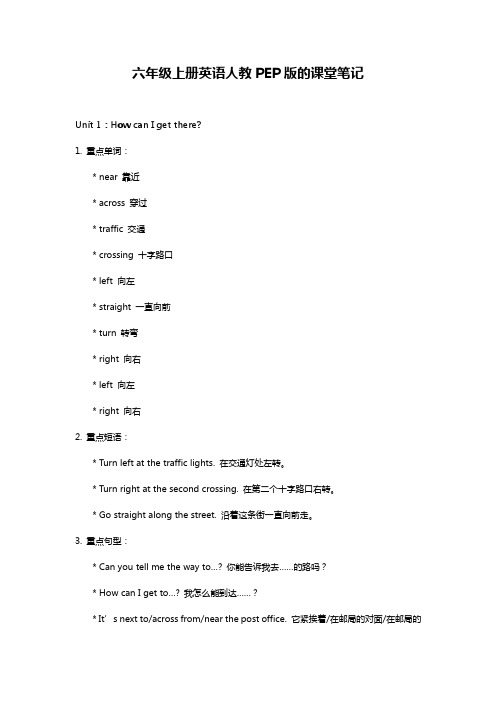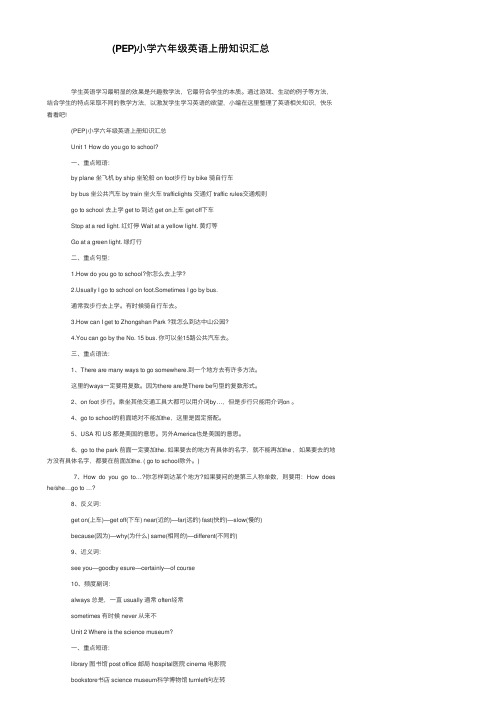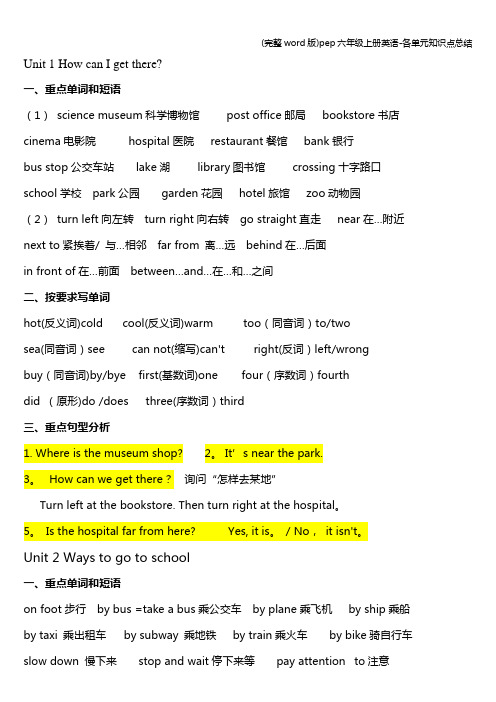PEP 六年级上册 单词、句型重点
人教版六年级英语上册全部单词+重点句型汇总

人教版六年级英语上册全部单词+重点句型汇总单词列表PEP人教版小学六年级上册单词表Unit 1science[5´saiEnsss]科学museum[mmju:´ziEmj]博物馆post office [pəust ˈɔfis]邮局bookstore [bukstɔː]书店cinema [ˈsinimə]电影院hospital [ˈhɔspitl]医院crossing [ˈkrɔsiŋ]十字路口turn [təːn]转弯left [left]左straight [streit]笔直地right [rait]右ask[ɑːsk]问sir [səː, sə](对男子的礼貌称呼)先生interesting[ˈintristiŋ]有趣的Italian[iˈtæljən]意大利的restaurant[ˈrestrɔnt]餐馆pizza[ˈpiːtsə]比萨饼street[striːt]大街;街道get[ɡet]到达GPS[dʒiː piː es]全球(卫星)定位系统gave[ɡeiv](give[ɡiv]的过去式)提供;交给feature[ˈfiːtʃə]特点follow[ˈfɔləu]跟着far[fɑː]较远的tell[tel]告诉1.---Where is the restaurant? 餐厅在哪里?----It’s next to the park on Dong fang Street. 它在东方路,在公园附近。
2.---How can we get there? 我们怎么去哪里?----Turn left at the bookstore. Then turn right at the hospital.书店左转,然后医院右转。
3. He now has GPS. 他现在有GPS。
4. What an interesting film! 多么有趣的电影!Unit 2on foot [ɔn] [fut]步行by[bai](表示方式)乘bus[bʌs]公共汽车plane [plein]飞机taxi[ˈtæksi]出租汽车ship[ʃip](大)船subway[ˈsʌbwei]地铁train[trein]火车slow[sləu]慢的down[daun]减少;降低slow down[sləu] [daun]慢下来stop[stɔp]停下Mrs[ˈmisiz]夫人early[ˈəːli]早到的helmet[ˈhelmit]头盔must[mʌst]必须wear[wɛə]戴attention[əˈtenʃən]注意pay attention to[pei]注意pay[pei] v.付款;给予(注意) n.工资traffic[ˈtræfik]交通traffic lights交通信号灯Munich[ˈmju:nik]慕尼黑(德国城市)Germany[ˈdʒə:məni]德国Alaska[əˈlæskə]阿拉斯加州(美国州名)sled[sled]雪橇fast[fɑ:st]快的ferry[ˈferi]轮渡Papa Westray[,pɑːpəˈwestrei]帕帕韦斯特雷岛Scotland [ˈskɔtlənd]苏格兰1.---How do you come to school? 你怎么上学?----Usually, I come on foot. 通常我走路来的。
pep六年级上册英语笔记

六年级上册英语人教PEP版的课堂笔记Unit 1:How can I get there?1. 重点单词:* near 靠近* across 穿过* traffic 交通* crossing 十字路口* left 向左* straight 一直向前* turn 转弯* right 向右* left 向左* right 向右2. 重点短语:* Turn left at the traffic lights. 在交通灯处左转。
* Turn right at the second crossing. 在第二个十字路口右转。
* Go straight along the street. 沿着这条街一直向前走。
3. 重点句型:* Can you tell me the way to…? 你能告诉我去……的路吗?* How can I get to…? 我怎么能到达……?* It’s next to/across from/near the post office. 它紧挨着/在邮局的对面/在邮局的附近。
4. 语法知识:* 用“Can you tell me the way to…?”和“How can I get to…?”询问道路和交通方式。
* 用“next to/across from/near”等介词表达位置关系。
5. 功能话题:问路和指路,描述位置关系。
6. 文化知识:了解不同国家的交通规则和交通标志。
Unit 2:Where is the science museum?1. 重点单词:* science museum 科学博物馆* library 图书馆* hospital 医院* cinema 电影院* post office 邮局2. 重点短语:* Excuse me. 对不起。
* Thank you very much/a lot. 非常感谢你。
3. 重点句型:- Excuse me, where is the science museum? 对不起,请问科学博物馆在哪里?- It’s next to/across from/near the post office. 它紧挨着/在邮局的对面/在邮局的附近。
PEP人教版英语六年级上册-各单元重点词汇句型归纳整理

一般现在时用法1.表示事物或人物的特征、状态。
如:The sky is blue.天空是蓝色的。
2.表示经常性或习惯性的动作。
如:I get up at six every day.我每天六点起床。
3.表示客观现实。
如:The earth goes around the sun.地球绕着太阳转。
结构:动词:主语+be(am,is,are)+其它。
如:I am a boy.我是一个男孩。
2.行为动词:主语+行为动词(+其它)。
如:We study English.我们学习英语。
当主语为第三人称单数(he, she, it)时,要在动词后加“-s”或“-es”。
如:Mary likes Chinese.玛丽喜欢汉语。
否定句,一般疑问句,特殊疑问句变化动词的变化。
(1)否定句:主语+ be + not +其它。
如:He is not a worker.他不是工人。
(2)一般疑问句:Be +主语+其它如:—Are you a student—Yes. I am. / No, I’m not.(3)特殊疑问句:疑问词+一般疑问句如:Where is my book2.行为动词的变化。
(1)否定句:主语+ don’t( doesn’t ) +动词原形+其它。
如:I don’t like milk.当主语为第三人称单数时,要用doesn’t构成否定句。
如:He doesn’t often play football.(2)一般疑问句:Do( Does ) +主语+动词原形+其它如:—Do you often play the piano—Yes, I do. / No, I don’t.当主语为第三人称单数时,要用does构成一般疑问句。
如:—Does she go to work by bike—Yes, she does. / No, she doesn’t.(3)特殊疑问句:疑问词+一般疑问句如:How does your mother go to work一般过去时一、一般过去时的概念一般过去时表示过去某个时间发生的动作或状态。
六年级上册英语重点单词重点句子总复习

PEP六年级上册四会单词及句子复习Unit1第一单元四会单词:Sciencemuseum科学博物馆postoffice邮局bookstore书店cinema电影院hospital医院crossing十字路口turnleft向左转gostraight直走turnright向右转四会句子:1--Whereisthemuseumshop博物馆的商店在哪儿--It`snearthedoor在大门附近2--Howcanwegetthere我们怎么到那儿--Turnleftatthebookstore到书店左转Unit2第二单元四会单词:onfoot走路bybus乘公共汽车bytaxi乘出租车byplane乘飞机bysubway乘地铁byship乘船bytrain乘火车slowdown减速stop停下wait等go走四会句子:1--Howdoyoucometoschool你怎么来学校的--Usually,Icomeonfoot通常我走路来2IntheUSApeopleonbikesmustwearone.在美国骑自行车的人必须戴头盔;3 Don’tgoattheredlight别闯红灯;4Imustpayattentiontothetrafficlights我必须注意交通信号灯Unit3第三单元四会单词:visitmygrandparents拜访我的外祖父母seeafilm看电影takeatrip远行gotothesupermarket去超市dictionary词典comicbook连环画书wordbook单词书postcard明信片四会句子:1--Whatareyougoingtodotomorrow你明天打算做什么--I’mgoingtohaveanartlesson.我要上美术课2 We’regoingtodrawsomepicturesinRenminPark.我要到人民公园去画画3--Whereareyougoing你们打算去哪儿--We`regoingtothecinema我们打算去电影院4Whenareyougoing你们什么时候去Unit4第四单元四会单词:dancing跳舞singing唱歌readingstories看故事书playingfootball踢足球doingkungfu打功夫cooksChinesefood做中国菜studiesChinese学习汉语doeswordpuzzles猜字谜goeshiking远足四会句子:1--WhatarePeter`shobbies彼得有什么爱好--Helikesreadingstories他喜欢读故事2--DoesheliveinSydney他住在悉尼吗--No,hedoesn`t不,他没有3--Doeshelikedoingwordpuzzlesandgoinghiking他喜欢猜字谜和远足吗--Yes,hedoes是的,他喜欢Unit5第五单元四会单词:factoryworker工厂工人postman邮递员businessman生意人policeofficer警察fisherman渔民scientist科学家pilot飞行员coach教练四会句子:1--Whatdoeshedo他是做什么的--Heisabusinessman.他是商人2--Wheredoeshework他在哪儿工作--Heworksatsea.他在海上工作;3--Howdoeshegotowork他怎么上班--Hegoestoworkbybike.他骑自行车上班;Unit6第六单元四会单词:angry生气的afraid害怕的sad悲伤地worried担心的happy开心的seeadoctor看医生domoreexercise做更多的锻炼takeadeepbreath深深吸一口气wearwarmclothes穿暖和的衣服counttoten数到十四会句子:1 They’reafraidofhim.它们害怕它2Thecatisangrywiththem.这只猫生它们的气;3What`swrong怎么了Yourfatherisill.你爸爸生病了;4Heshouldseeadoctorhismorning.他今天早上应该去看病;5Don`tbesad.别伤心PEP六年级上册常用句型问路和指路-Whereis+地点名词……在哪儿-It’s+介词短语.在……;-Howcanwe/Igetto...我们/我怎么到……呢-Turnleft/right./Gostraight./Youcangoby+交通工具.左/右转;直走;/你可以乘坐……去那儿;询问并回答对方来或去某地的交通方式:Howdoyoucome/goto+地点你/你们怎么来/去……I/Wecome/goto+地点+bybike/onfoot….我/我们骑自行车/步行……来/去……询问对方某个时间打算做某事的句型及答语:-Whatareyougoingtodo+表示将来的时间你……打算去做什么-I’mgoingto+动词原形+将来的时间.我打算……去做……询问对方打算去哪儿的句型及答语:Whereareyougoing+表示将来的时间你……打算去哪儿I’mgoingto+表示地点的名词.我打算……去….询问对方打算什么时候去做某事的句型及答语:Whenareyougoing+动词原形你打算什么时候去……Iamgoingto+动词原形+将来时间.我打算……去……;注:begoingto+动词原形=will+动词原形询问别人的爱好并作出回答:Whatis/are某人的hobby/hobbies……有什么爱好=Whatdo/does某人like主语+like/likes+动词-ing+其他.……喜欢做……=某人的hobby is/are….某人的爱好是...;助动词does引导的一般疑问句及答语:Does+第三人称单数主语+动词原形+其他……做……吗-Yes,he/she/itdoes.No,he/she/itdoesn’t.是的,他/她/它是;不,他/她/它不是;询问他人的职业并作出回答:Whatdo/does+主语+do......是做什么的=Whatbe+某人主语+be动词+a/an+职业名词.……是……询问他人的工作地点并作出回答:Wheredo/does+主语+work……在哪儿工作主语+work/works+表示地点的副词或介词短语;……在……工作;询问他人怎么去上班:Howdo/does+主语+gotowork主语+gotowork+bybike/onfoot….询问他人正在做什么及描述正在做某事:What+be+某人+doing主语+be动词+动词-ing+其他….正在…Don’t祈使句:Don’t+动词原形+其他.不要……Don’t+be+形容词+其他.不要……表达对某人或某事的关心:What’wrongwith+某人描述及提问某人的感受的句型:How+do/does某人+feel主语+feel/feels+表示感受的形容词+其他.=主语+be动词+表示感受的形容词+其他.……是……用should来给对方提建议及征求意见的句型:Whatshould某人+do某人should+动词原形.你应该…..语法复习一、现在进行时态3种变化规律1.直接加ing:do—doing draw—drawing cook—cooking answer—answering read—reading listen—listening fly—flying sing—singing play—playing2.去掉末尾的e加ing:write—writing dance—dancing take—taking have—having make—making ride—riding dive—diving3.双写末尾字母加ing:get—getting run—running swim—swimming sit—sitting put—putting你正在干什么WhatareyoudoingI’mansweringthephone.他/她/它正在干什么Whatishe/she/itdoingHe’s/She’s/It’s …他她、它们正在干什么WhataretheydoingTheyare…看到like或likes后面的动词要加上ing二、一般将来时态begoingto/will+动词原形表示一般将来时的时间状语有:thismorning,thisafternoon,thisevening,tomorrow,tonight,thisweekend,ontheweekend,nextweek,nextmonth,nextyear,nextweekend.例:今晚你将要做什么Whatareyougoingtodothisevening—I’mgoingtothecinema.I’mgoingtovisitmygrandparents.你将什么时候去Whenareyougoing—I’mgoingat7:10.你将怎样去呢Howareyougoing—I’mgoingbybus.今天下午你将要去哪里Whereareyougoingthisafternoon—I’mgoingtothebookstore.你将要买什么呢WhatareyougoingtobuyI’mgoingtobuyacomicbook.你将和谁一起去WhoareyougoingwithI’mgoingwithmyparents.三、第三人称单数后面的动词要加s或es1.一般情况加s,如:read—reads;live—lives;play—plays;sing—sings2.动词末尾以s,x,ch,sh或部分以o结尾的加es记住课本中出现的这几个:watches,teaches,goes,does,washes,passes3.辅音字母+y结尾的把y变i再加es,如:fly—flies;study—studies4.特殊情况:have--has5.第三人称单数包括:he;she;it;myfather/friend;Amy/Hangzhou等一个人名或地名;例如:Helikesdrawingpictures.Sheworksinacarcompany.Itcomesfromtheclouds.Myfathergoestoworkonfoot.LiLeioftenplayscomputergamesafterlunch.6.一般疑问句记住:前面助动词加了es,后面动词就不变化了;如:DoessheteachEnglishDoesyourpenpalliveinHangzhou四、不定冠词a和an的用法a用于辅音因素开头的单词前;an用于元音因素开头的单词前;记住课本中出现的要用an的单词:anactor;anactress;anartist;anengineer;anaccountant;anEnglishbook;anorange;anapple;anoldwoman五、动词变化为表示职业或人的单词1.动词后面加er:work—worker;teach—teacher;sing—singer;TV report—TVreporterclean—cleaner2.动词后面加or:act—actor;doctor3.末尾以e结尾的直接加r:write—writer;dance—dancer;drive—driver4.动词后面加ist:art—artist;tour—tourist5.职业男女有区别的:警察policeman—policewoman;演员actor—actress六、8个疑问词which哪一个what什么when什么时候where哪里whose谁的why为什么how怎么样who谁七、人称代词和物主代词I—my-mine我—我的-我的you—your-yours你;你们—你的;你们的-你的;你们的he—his-his他—他的-他的she—her-hers她—她的-她的we—our-ours我们—我们的-我们的they—their-theirs他们/她们/它们—他们的/她们的/它们的他们的/她们的/它们的八、can后面加动词原形WhatcanyoudoIcancookthemeals.Hecanflykites.Shecan playtheviolin.弹小提琴PEP小学英语六年级上册各单元作文一、介绍你和家人上学或上班的方式Igotoschoolonfoot.Mysistergoestoschoolonfoot,too.Mybrothergoestoschoolby bike.Myfathergoestoworkbycar.Mymothergoestoworkbybike.二、看图,说说你怎样去电影院Igotothecinema.Istartfromhere.Gostraightforfiveminutes.Thenturnleftatthe library.Gostraightforoneminute.Thelibraryisontheright.三、读读下周末你和朋友的计划I’mgoingtohaveabusyweekendwithmyfriends.OnSaturdaymorning,wearegoingtog oshpping.OnSaturdayafternoon,wearegoingtothepark.OnSundaymorning,wearego ingtogofishing.OnSundayafternoon,wearegoingtoflykites.Wewillbehappy.四、说说你和你家人的爱好;Ilikeflyingkites.Myfatherlikesdiving.Mymotherlikesplayingthepipa.Mybroth erlikesridingabike.Mysisterlikeslisteningtomusic.MyfriendJohnlikesflying kites.Amylikescollectingstamps.ZhangPenglikesplayingfootball.ChenJielike sridingabike.五、介绍你一家人的职业和上班地点和方式;Myfatherisateacher.Heworksinaschool.Hegoestoworkbycar.Mymotherisanaccoun tant.Sheworksinabank.Shegoestoworkbybus.六、写一封信给你的笔友,介绍你一家人的情况;DearAmy,MynameisSarah.I’m13.I’mtallandthin.Ilikeswimming.Myfatheris40.He’stal landstrong.Helikesreadingbooks.Heisworker.Heworksinafactory.Hegoestowork bycar.M ymotheris39.She’sshortandthin.Shelikescooking.Sheworksinabooksto re.Shegoestoworkonfoot.Yours,Sarah七、看图介绍图中这个人的情况;HeisBen.Heis26.Heisapoliceman.Hegoestowork bybus.Helikesplayingtheviolin.Helikesgoingfishing,too.。
(PEP)小学六年级英语上册知识汇总

(PEP)⼩学六年级英语上册知识汇总 学⽣英语学习最明显的效果是兴趣教学法,它最符合学⽣的本质。
通过游戏、⽣动的例⼦等⽅法,结合学⽣的特点采取不同的教学⽅法,以激发学⽣学习英语的欲望,⼩编在这⾥整理了英语相关知识,快乐看看吧! (PEP)⼩学六年级英语上册知识汇总 Unit 1 How do you go to school? ⼀、重点短语: by plane 坐飞机 by ship 坐轮船 on foot步⾏ by bike 骑⾃⾏车 by bus 坐公共汽车 by train 坐⽕车 trafficlights 交通灯 traffic rules交通规则 go to school 去上学 get to 到达 get on上车 get off下车 Stop at a red light. 红灯停 Wait at a yellow light. 黄灯等 Go at a green light. 绿灯⾏ ⼆、重点句型: 1.How do you go to school?你怎么去上学? ually I go to school on foot.Sometimes I go by bus. 通常我步⾏去上学。
有时候骑⾃⾏车去。
3.How can I get to Zhongshan Park ?我怎么到达中⼭公园? 4.You can go by the No. 15 bus. 你可以坐15路公共汽车去。
三、重点语法: 1、There are many ways to go somewhere.到⼀个地⽅去有许多⽅法。
这⾥的ways⼀定要⽤复数。
因为there are是There be句型的复数形式。
2、on foot 步⾏。
乘坐其他交通⼯具⼤都可以⽤介词by…,但是步⾏只能⽤介词on 。
4、go to school的前⾯绝对不能加the,这⾥是固定搭配。
5、USA 和 US 都是美国的意思。
(完整word版)pep六年级上册英语-各单元知识点总结

Unit 1 How can I get there?一、重点单词和短语(1)science museum科学博物馆post office邮局bookstore书店cinema电影院hospital医院restaurant餐馆bank银行bus stop公交车站lake湖library图书馆crossing十字路口school学校park公园garden花园hotel旅馆zoo动物园(2)turn left向左转turn right向右转go straight直走near在…附近next to紧挨着/ 与…相邻far from 离…远behind在…后面in front of在…前面between…and…在…和…之间二、按要求写单词hot(反义词)cold cool(反义词)warm too(同音词)to/twosea(同音词)see can not(缩写)can't right(反词)left/wrongbuy(同音词)by/bye first(基数词)one four(序数词)fourthdid (原形)do /does three(序数词)third三、重点句型分析1. Where is the museum shop? 2。
It’s near the park.3。
How can we get there?询问“怎样去某地”Turn left at the bookstore. Then turn right at the hospital。
5。
Is the hospital far from here? Yes, it is。
/ No,it isn't。
Unit 2 Ways to go to school一、重点单词和短语on foot步行by bus =take a bus乘公交车by plane乘飞机by ship乘船by taxi 乘出租车by subway 乘地铁by train乘火车by bike骑自行车slow down 慢下来stop and wait停下来等pay attention to注意cross the road横穿马路traffic light通信号灯at home在家look right向右看look at朝…看play with和…一起玩二、按要求写单词go (反义词)come foot(复数)feet child(复数)childrenearly(反义词)late good(反义词)bad take(反义词)bringslow(反义词)quick/fast go(过去式)went do(过去式)diddo(第三人称单数) does go(第三人称单数)goessame 相同的(反义词)different不同的miss(过去式)missedwrong 错误(反义词)right正确can(否定形式)can’t三、重点句型分析1。
PEP小学英语六年级上册重点句型及词汇
PEP小学英语六年级上册重点句型及词汇Unit 1:How do you go there?重点单词:by (经……,乘……)foot(脚)bike(自行车)bus(公共汽车)train(火车)how(怎样)go to school(上学)traffic(交通)traffic light(交通灯)traffic rule(交通规则)stop(停;停车站)wait(等;等待)get to(到达)by plane(乘飞机)by ship(乘轮船) by subway(乘地铁) remember 记住find 寻找difference 不同的same 相同的every每个county国家mean 意思是drive 驾驶right 右边left左边side边however 但是if 如果near 旁边far 远的must必须know 知道England 英国Australia 澳大利亚first..then …首先..然后… fifth floor 第五层楼which (哪一个)what (什么)when (什么时候)where (哪里)whose (谁的)why (为什么)how (怎么样)who (谁)重点句型:How do you go to school, Sarah?萨拉,你怎样去上学?Usually I go to school on foot.通常我步行去上学。
Sometimes I go by bike.有时候,我骑自行车去。
How can I get to Zhongshan Park?我怎样能到达中山公园?You can go by the No.15 bus.你可以乘15路公交车去My home is near.我的家很近。
What about you?你呢?Look at the traffic lights.看交通灯。
Remember the traffic rules.记住交通规则。
PEP英语六年级上册重点词汇及句型
PEP英语六年级上册重点词汇及句型(1—3单元)第一单元:词汇:science科学museum博物馆post office邮局bookstore 书店cinema电影院hospital医院crossing十字路口turn right右转弯turn left左转弯go straight直行句型:博物馆的商店在哪里?Where is the museum shop?在大门附近。
It’s near the door.它和博物馆紧挨着。
It’s next to the museum.我们怎么到那儿呢?How can we get there?到书店左转。
然后到医院右转。
Turn left at the bookstore. Then turn right at the hospital.第二单元:词汇:on foot步行by( 表示方式)乘bus公共汽车plane飞机taxi 出租汽车ship(大)船subway地铁train火车slow down慢下来stop 停下句型:你怎么来学校的?How do you come to school?通常我走路来。
有时我也乘公共汽车。
Usually, I come on foot. Sometimes I come by bus.在美国骑自行车的人必须带头盔。
In the USA people on bikes must wear one.别闯红灯!Don’t go at the red light.我必须注意交通信号灯!I must pay attention to the traffic light.黄灯时慢下来并且停下。
Slow down and stop at a yellow light.红灯时停下等一等。
Stop and wait at a red light.绿灯行。
Go at a green light.第三单元:词汇:visit拜访see a film看电影take a trip去旅行supermarket 超市evening晚上tonight今晚tomorrow明天next week下周dictionary词典comic滑稽的comic book连环画word book单词书postcard 明信片句型:你明天打算做什么?What are you going to do tomorrow?我要上美术课。
人教版PEP小学英语六年级上册重点句型及语法知识汇总
人教版PEP小学英语六年级上册重点句型及语法知识汇总Unit 1 How can I get there?重点单词XXX。
post office邮局,XXX。
XXX。
XXX。
crossing十字路口。
turn left左转。
turn right右转。
gostraight直走。
map地图。
compass指南针。
GPS全球定位系统。
stars星星。
XXX意大利餐厅。
getto到达。
重点句型1.---Where is the restaurant?餐厅在哪里?It’s next to the park on Dong fang Street.它在东方路,在公园附近。
2.---How can we get there?我们怎么去哪里?XXX left XXX.书店左转,然后病院右转。
3.He now has GPS.他现在有GPS。
4.What an interesting film!何等风趣的片子!方位词复:XXX紧挨着,near在。
邻近,XXX在。
背面,XXX在。
旁边,in front of在。
前面。
Unit 2 Ways to go to school重点单词on foot走路。
by bike骑车。
by bus乘公交。
by train乘火车。
XXX乘地铁。
by ship搭船。
by XXX乘飞机。
slow down 慢下来。
XXX交通灯。
traffic rules交通划定规矩。
go/come to school上学。
by sled坐雪橇。
byferry坐轮渡。
pay n to留意。
traffic lights交通灯。
and wait at a red light红灯停等一等。
slow downand。
at a yellow light黄灯减速并停下。
Go XXX。
重点句型1.---How do you come to school?你怎么上学?----Usually。
I come on foot.通常我走路来的。
PEP版英语六年级上下册重点单词+句型整理
六年级上册册重点单词+句子归纳一.重点单词六年级上册:Unit 1science ['saɪəns] 科学museum [mjuː'zɪəm] 博物馆post office 邮局bookstore [ˈbʊkstɔː] 书店cinema [ˈsɪnəmə] 电影院hospital [ˈhɒspɪtl] 医院crossing ['krɔːsɪŋ] 十字路口turn [tɜːn] 转弯left [left] 左straight [streɪt] 笔直的right [raɪt] 右Unit 2on foot 步行by [baɪ] 乘bus [bʌs] 公共汽车plane [pleɪn] 飞机taxi ['tæksi] 出租汽车ship [ʃɪp] 船subway ['sʌbweɪ] 地铁train [treɪn] 火车slow [sləʊ] 慢的down [daʊn] 减少;降低slow down 慢下来stop [stɒp] 停下Unit 3visit ['vɪzɪt] 拜访film [fɪlm] 电影see a film 看电影trip [trɪp] 旅行take a trip 去旅行supermarket ['sjuːpəˌmɑːkɪt] 超市evening ['iːvnɪŋ] 晚上;傍晚tonight [tə'naɪt] 在今晚tomorrow [tə'mɔːrəʊ] 明天next week 下周dictionary ['dɪkʃəneri] 词典comic [ˈkɒmɪk] 滑稽的comic book 连环画册word [wɜːd] 单词word book 单词书postcard ['pəʊstˌkɑːd] 明信片Unit 4studies 学习puzzle [ˈpʌz(ə)l] 谜hiking [haɪkɪn] 远足pen pal 笔友hobby [ˈhɒbi] 业余爱好Unit 5factory ['fæktəri] 工厂worker ['wɜːkə] 工人postman ['pəʊstmən] 邮递员businessman ['bɪznɪsmæn] 商人police office 警察fisherman [ˈfɪʃəmən] 渔民scientist ['saɪəntɪst] 科学家pilot [ˈpaɪlət] 飞行员coach [kəʊtʃ] 教练Unit 6angry ['æŋgri] 生气的afraid [ə'freɪd] 害怕sad [sæd] 难过的worried ['wʌrɪd] 担心的;发愁的happy ['hæpi] 高兴的see a doctor 看病wear [weə] 穿more [mɔː] 更多的deep [diːp] 深的breath [breθ] 呼吸take a deep breath 深呼吸count [kaʊnt] 数数count to ten 数到十六年级下册Unit 1younger [ˈjʌŋɡə] 更年轻的(young)older 更年长的(old)taller 更高的(tall)shorter 更矮的;更短的longer 更长的(long)thinner 更瘦的(thin)heavier 更重的(heavy)bigger 更大的(big)smaller 更小的(small)stronger 更强壮的(strong)Unit 2cleaned 打扫(clean的过去式)stayed 停留;呆(stay)washed 洗(wash)watched 看(watch)had [hæd] 患病;得病(have)had a cold 感冒slept 睡觉(sleep)read [riːd] 读(read)saw [sɔː] 看见(see)last [lɑːst] 最近的;上一个的yesterday ['jestədi] 昨天before [bɪ'fɔː] 在……之前Unit 3went [went] 去(go)camp [kæmp] 野营went camping 野营fish [fɪʃ] 钓鱼went fishing 去钓鱼rode [rəʊd] 骑hurt [hɜːt] 受伤(hurt)ate [eɪt] 吃(eat)took [teɪk] 拍照(take)took pictures 照相bought [bɔːt] 买(buy)gift [ɡɪft] 礼物Unit 4dining hall 饭厅grass [grɑːs] 草坪gym [dʒɪm] 体育馆ago [ə'gəʊ] 以前cycling [ˈsaɪklɪŋ] 骑自行车运动go cycling 去骑自行车ice-skate 滑冰badminton [ˈbædmɪntən]羽毛球运动二.重点句型六年级上册1. How do you go to school, Sarah? ------- Usually I go to school on foot. Sometimes I go by bike.你怎样去上学的,萨拉? 我经常步行去上学.有时候骑自行车去.2. How can I get to Zhongshan Park? ------ You can go by the No.15 bus.我怎样能到达中山公园? 你可以坐十五路公共汽车去.3. Where is the cinema, please? ------ It’s next to the hospital.请问电影院在哪? 它在医院的旁边.4. Turn left at the cinema, then go straight. It’s on the left.在电影院那左转,然后直走.它就在左边.5. What are you going to do on the weekend? ------ I’m going to visit my grandparents this weekend.你周末打算去做什么? 我这个周末打算去看望我的爷爷奶奶.6. Where are you going this afternoon? ------ I’m going to the bookstore.你今天下午打算去哪? 我打算去书店.7. What are you going to buy? ------ I am going to buy a comic book.你打算去买什么? 我打算去买一本漫画书.8. What is your hobby? ------ I like collecting stamps. He likes collecting stamps,too.你的爱好是什么? 我喜欢收集邮票. 他也喜欢收集邮票.9. Does she teach English? ------ No, she doesn’t. ------ Yes, she does.她教英语吗? 不,她不是. 是的,她是.10. What does your mother do? ------ She is a TV reporter.你妈妈是做什么的? 她是一个电视台记者.11. Where does she work? How does she go to work?她在哪工作? 她怎样去工作的?12. Where does the rain come from? ------ It comes from the clouds.雨来自哪里? 它来自云.13. How do you do that? What should you do then?你是怎样做的. 然后你应该做什么?六年级下册1. How tall are you? ------ I’m 164 cm tall.你有多高? 我164厘米高.You’re shorter than me. You’re 4 cm taller than me.你比我矮. 你比我高4厘米.2. How heavy are you? ------ I’m 48 kg. I’m thinner than you, and shorter.你有多重? 我48千克.我比你要更瘦,更矮.3. What’s the matter? ------ My throat is sore. My nose hurts.怎么了? 我的喉咙痛.我的鼻子不舒服.4. How are you, Liu Yun? You look so happy.你怎么了,刘云? 你看起来很高兴.How are you, Sarah? You look sad today.你怎么了,萨拉?你今天看起来很伤心.5. What did you do last weekend? ------ I played football.你上周末在做什么? 我在踢足球.6. Did you read books? ------ Yes, I did. ------ No, I didn’t.你看过书了吗? 是的,我是. 不,我没有.7. Where did you go on your holiday? ------ I went to Xinjiang.你假期去了哪? 我去了新疆.8. How did you go there? ------ I went by train.你怎样去的? 我乘火车去的.。
- 1、下载文档前请自行甄别文档内容的完整性,平台不提供额外的编辑、内容补充、找答案等附加服务。
- 2、"仅部分预览"的文档,不可在线预览部分如存在完整性等问题,可反馈申请退款(可完整预览的文档不适用该条件!)。
- 3、如文档侵犯您的权益,请联系客服反馈,我们会尽快为您处理(人工客服工作时间:9:00-18:30)。
六年级上册句型总揽(U 5 6 三单) 197个单词,一般现在时 + 一般将来时Unit 1 How Do You Go To There? 话题:日常活动(交通)时态:一般现在时句型:1. How 引导的特殊疑问句,围绕人们的出行方式展开交际:--- How do you + 行为活动?--- I + 行为活动 + 出行方式。
例:A: How do you go to school? B: I usually go to school on foot.2. How 引导的特殊疑问句,外出问路:--- How can I get to + 目的地?--- You can go + 交通方式。
例:A: How can I get to Zhongshan park? B: You can go by the No. 15 bus.Unit 2 Where Is the Science Museum? 话题:日常活动(位置交通外出)时态:一般现在时句型:1. Where 引导的特殊疑问句,就建筑物的位置进行问答:--- Where is + 建筑物? --- It's next to + 建筑物。
例:A: Where is the cinema, please? B: It's next to the hospital.2. 祈使句,外出活动。
例: Turn left at the cinema, then go straight.Unit 3 What Are You Going to Do? 话题:日常活动(打算、计划)时态:一般将来时句型:What, Where, When等引导的特殊疑问句,对将要进行的活动等进行问答:--- What are you doing to do + 时间?--- I'm going to + 行为活动。
--- Where / When are you going? --- I'm going + 地点 / 时间。
例:A:What are you going to do on the weekend? B: I'm going to visit my grandparents this weekend.Unit 4 I Have a Pen Pal 话题:爱好、交通、朋友时态:一般现在时、第三人称单数句型:1. What 引导的特殊疑问句,互相交流各自的兴趣爱好:--- What's your hobby? --- I like + 行为活动(doing)。
例: A: What's your hobby? B: I like collecting stamps.2. 第三人称单数作主语:He / She + 动词的第三人称单数形式(does)。
例:He likes collecting stamps, too.3. Does 引导的一般疑问句,用来确定自己对事情的判断:--- Does he / she + 动词原形?--- Yes, he / she does. No, he / she doesn't. 例: What does he like?A: Does she teach English? B: No, she doesn't.Unit 5 What Does She Do? 话题:家庭成员、职业时态:一般现在时、三单句型:1. What引导的特殊疑问句,询问他人的职业:--- What does + 第三人称单数 + do? --- She / He + 动词的第三人称单数形式。
例:A: What does your mother do? B: She is a TV reporter.2. 综合运用What, Where, How等疑问词,询问他人(第三人称)有关工作的情况:--- What / Where / How ... + does + he / she + 动词原形(do)? --- He / She + 动词的第三人称单数形式(does). 例:A: How does she go to work? B: She goes to work by bus.Unit 6 The Story of Rain 话题:大自然时态:一般现在时句型:1. Where 引导的特殊疑问句,来探讨自然界的循环变化:--- Where does +自然界的事物+come from? --- It comes from + ... 例:A: Where does the rain come from? B: It comes from the clouds.2. 综合运用What, How等疑问词,来交流植物的生长过程:How / What ... + do / should + you + do? 例:A: How do you do that? B: Put the seeds in the soil.人教版小学英语六年级上册Unit 1640. by [bai] 经,乘641. foot [fut] 脚642. bike [baik] 自行车643. bus [bʌs] 公共汽车644. train [trein] 火车645. plane [plein] 飞机646. ship [ʃip] 船;舰647. subway ['sʌbwei] 地铁648. how [hau] 怎样649. go to school 上学650. fifth [fifθ] 第五651. traffic ['træfik] 交通652. traffic light ['lait] 交通灯653. traffic rule [ru:l] 交通规则654. stop [stɔp] 停,停车站655. wait [weit] 等待656. remember [ri'membə] 记住657. get to 到达658. find [faind] 寻找;找到659. difference ['difərəns]不同;区别660. same [seim] 相同的661. every ['evri] 每个;所有的662. country ['kʌntri] 国家663. always ['ɔ:lweiz, -wiz] 总是664. mean [mi:n] 意思是665. drive [draiv] 驾驶666. right [rait] 右边的667. side [said] 边668. England ['iŋɡlənd] 英国669. Australia [ɔ'streiljə] 澳大利亚670. however [hau'evə] 但是671. left [left] 左边的672. if 如果673. must 必须674. know 知道Unit 2675. Library ['laibrəri] 图书馆676. Post [pəust] office['ɔfis, 'ɔ:-] 邮局677. hospital ['hɔspitəl] 医院678. cinema ['sinəmə] 电影院679. bookstore ['bukstɔ:] 书店680. science ['saiəns] museum[mju:'ziəm] 科学博物馆681. excuse [ik'skju:z, ik'skju:s] me对不起682. where 在哪里,到哪里683. please 请684. next to 与…相邻685. far 远686. supermarket ['sju:pə,mɑ:kit] 超市687. bank [bæŋk] 银行688. after school 放学以后689. want 想要690. buy 买691. a pair of 一双692. shoe store 鞋店693. get off 下车694. minute['minit] 分钟695. north [nɔ:θ] 北696. south [sauθ, sauð] 南697. east [i:st] 东698. west [west] 西699. turn [tə:n] 转弯700. right 右边701. left 左边702. straight [streit] 成直线地703. then [ðen] 然后704. twelfth [twelfθ] 第二十705. party ['pɑ:ti] 聚会;晚会706. tell 告诉707. start [stɑ:t] 开始708. take [teik] 乘坐709. look for 寻找Unit 3710. next week 下周712. this morning 今天上午713. this afternoon 今天下午714. this evening 今天晚上715. tonight [tə'nait] 今晚716. tomorrow [tə'mɔrəu] 明天717. take a trip [trip] 去旅行718. read a magazine [,mæɡə'zi:n]阅读杂志719.go to the cinema ['sinəmə] 去看电影720.theme [θi:m] park [pɑ:k] 主题公园721. the Great [ɡreit] Wall [wɔ:l]长城722. busy ['bizi] 忙碌的723. together [tə'ɡeðə] 一起地724. comic ['kɔmik] book 漫画书725. post [pəust] card [kɑ:d] 明信片726.newspaper ['nju:s,peipə, 'nju:z-]报纸727. magazine [,mæɡə'zi:n] 杂志728. dictionary ['dikʃənəri] 词典;字典729. buy [bai] 购买730. fruit stand [stænd] 水果摊731. pet shop 宠物商店732. need [ni:d] 需要733. plant [plɑ:nt, plænt] 植物734. else [els] 其他;另外735. shop [ʃɔp] 商店Unit 4736. hobby ['hɔbi] 爱好737. ride a bike--riding a bike 骑自行车738. dive—diving 跳水739. play the violin—playing the violin[,vaiə'lin] 拉小提琴740. make kites—making kites 制作风筝741. collect[kə'lekt] stamps[stæmp]—collecting stamps 集邮742. show[stæmp] 展览743. pen pal 笔友744. dear[diə] 亲爱的745. twin[twin] 双胞胎之一746. something ['sʌmθiŋ] 某事物747. must 一定;肯定748. fun 快乐;乐趣749. with 同…750. TV reporter 电视台记者751. live –lives 居住752. teach—teaches 教753. go—goes 去754. watch—watches 看755. read—reads 读,看756. does doesn’t=does not757. different ['difərənt] 不同的758. week [wi:k] 星期;周759. say [sei] 说760. soon [su:n] 不久761. excited [ik'saitid] 兴奋的;激动的Unit 5762. singer ['siŋə] 歌唱家,歌手763. writer ['raitə] 作家764. actor ['æktə] 男演员765. actress ['æktris] 女演员766. artist ['ɑ:tist] 画家767. TV reporter [ri'pɔ:tə]电视台记者768. Hong Kong 香港769. engineer [,endʒi'niə] 工程师770. accountant [ə'kauntənt] 会计771. policeman [pə'li:smən] 男警察772. salesperson ['seilz,pə:sən] 销售员773. cleaner ['seilz,pə:sən] 清洁工774. company ['kɔmpəni] 公司775. where [hwεə] 在哪里,到哪里776. work [wə:k] 工作777. factory ['fæktəri] 工厂778. design [di'zain] 设计779. tip [tip] 有用的小建议780. help [help] 帮助781. money ['mʌni] 钱782. well 好;对;满意地783. enjoy [in'dʒɔi] 从…获得乐趣784. tourist ['tuərist] 旅行者;785. way [wei] 路;786. motor cycle ['saikl] 摩托车787. police [pə'li:s] 警方;警察部门Unit 6788. rain [rein] 雨789. cloud [klaud] 云790. vapour ['veipə] 蒸汽;水汽791. sun [sʌn] 太阳792. stream[stri:m] 河,溪793. come from 来自,从…来794. shine [ʃain] 照耀795. become [bi'kʌm] 变成796. little ['litl] 小的797. drop [drɔp] 一滴798. wake [weik] up 醒来799. feel ['fi:l] 感觉到800. think [θiŋk] 想;思考801.meet [mi:t] 遇见802. high [hai] 高的803. other ['ʌðə] 其他的804. fall [fɔ:l] 落下805. down [daun] 向下806. into ['intu:] 进入807. come out 露出808. again [ə'ɡen] 又809. seed [si:d] 种子810. soil [sɔil] 土壤811. sprout[spraut] 苗,芽812. plant[plɑ:nt, plænt] 植物,种植813. should 应该814. then 然后815. garden ['ɡɑ:dn] 花园816. easy ['i:zi] 简单的817. put [put] 放818. several ['sevərəl] 一些819. day 天820. see 看见821. pot [pɔt] 锅碗瓢盆822. lovely ['lʌvli] 可爱的823. make sure [ʃuə, ʃɔ:] 核实824. month [mʌnθ] 月份825. still [stil] 仍然826. hardly ['hɑ:dli]几乎不。
